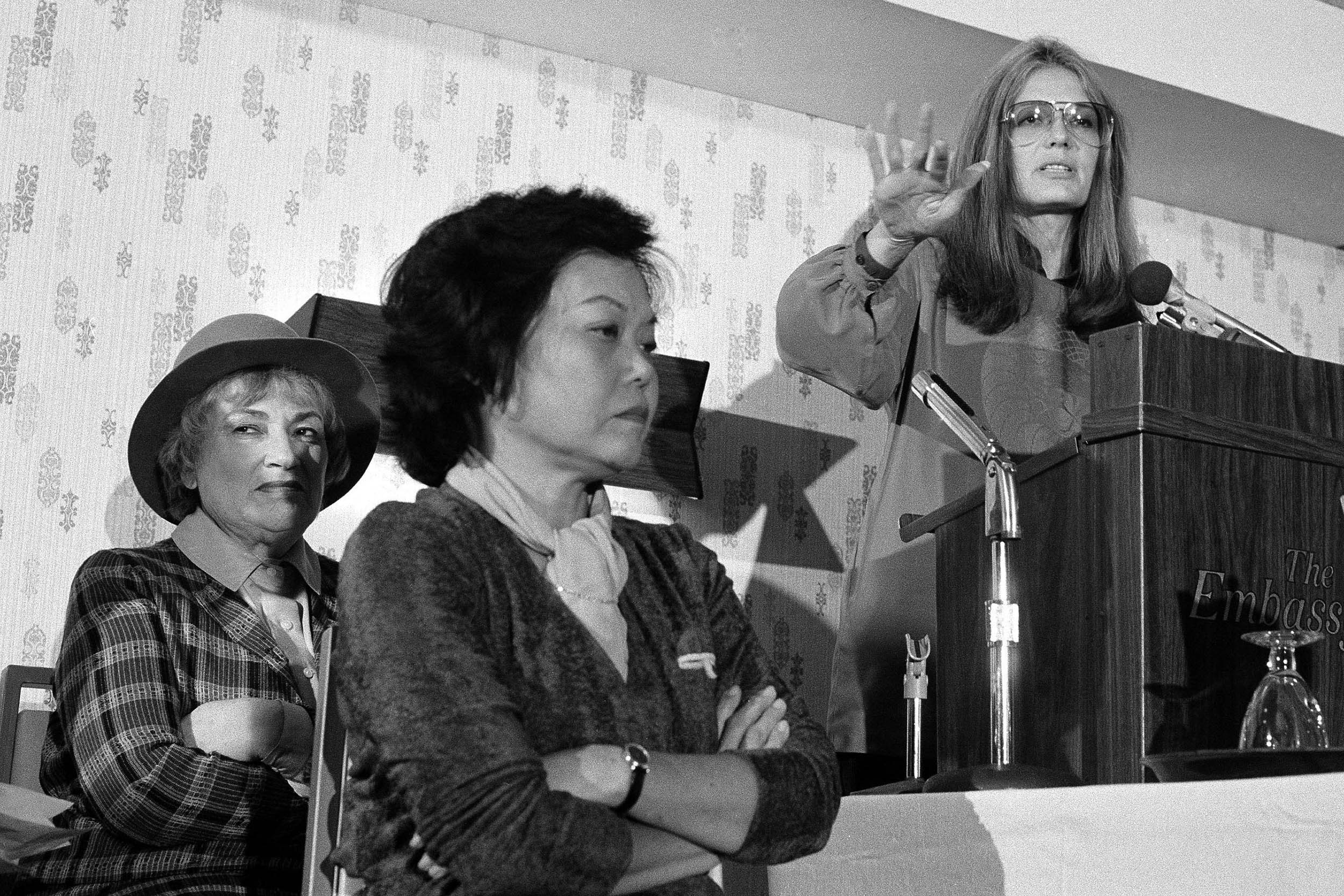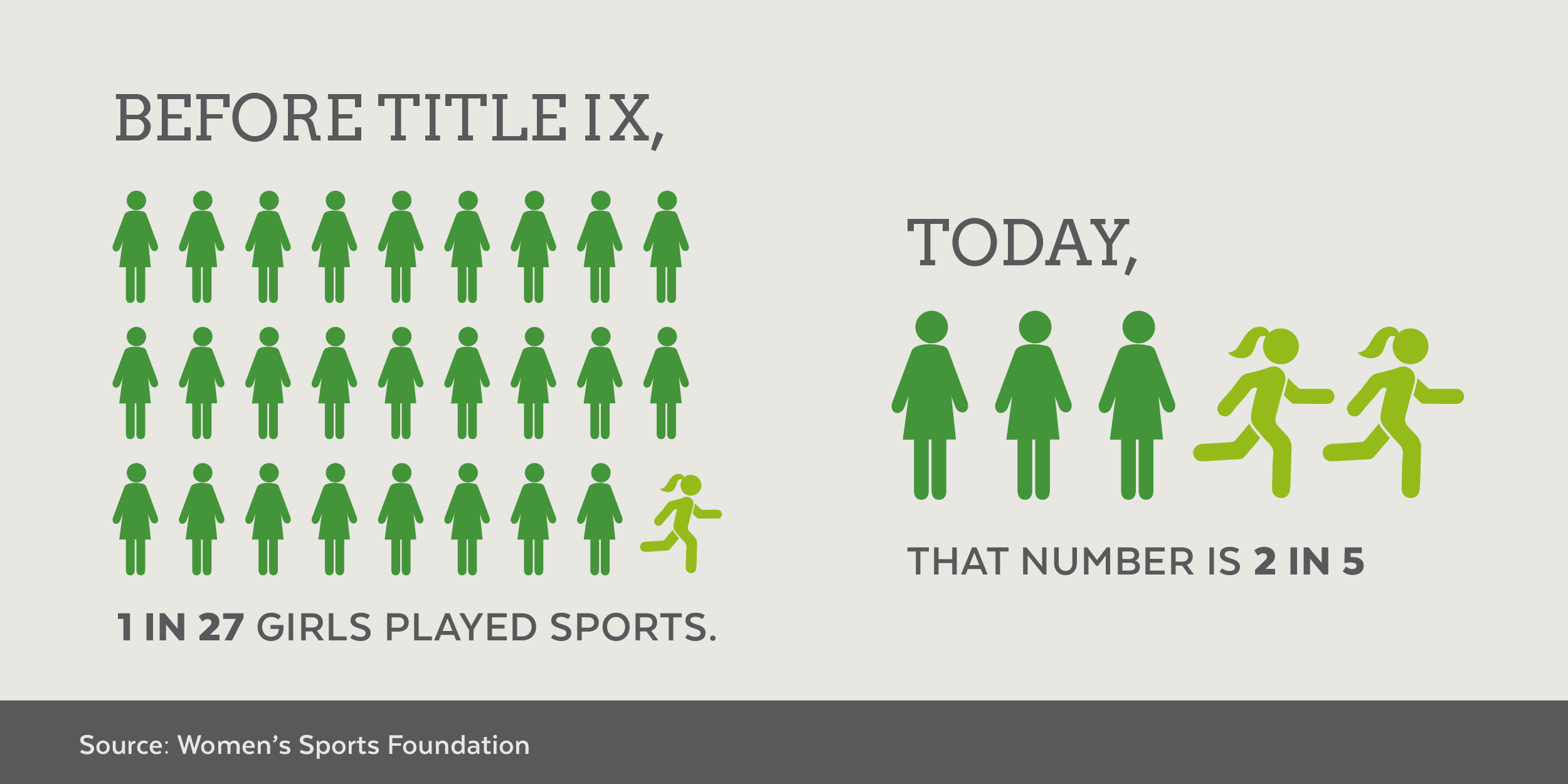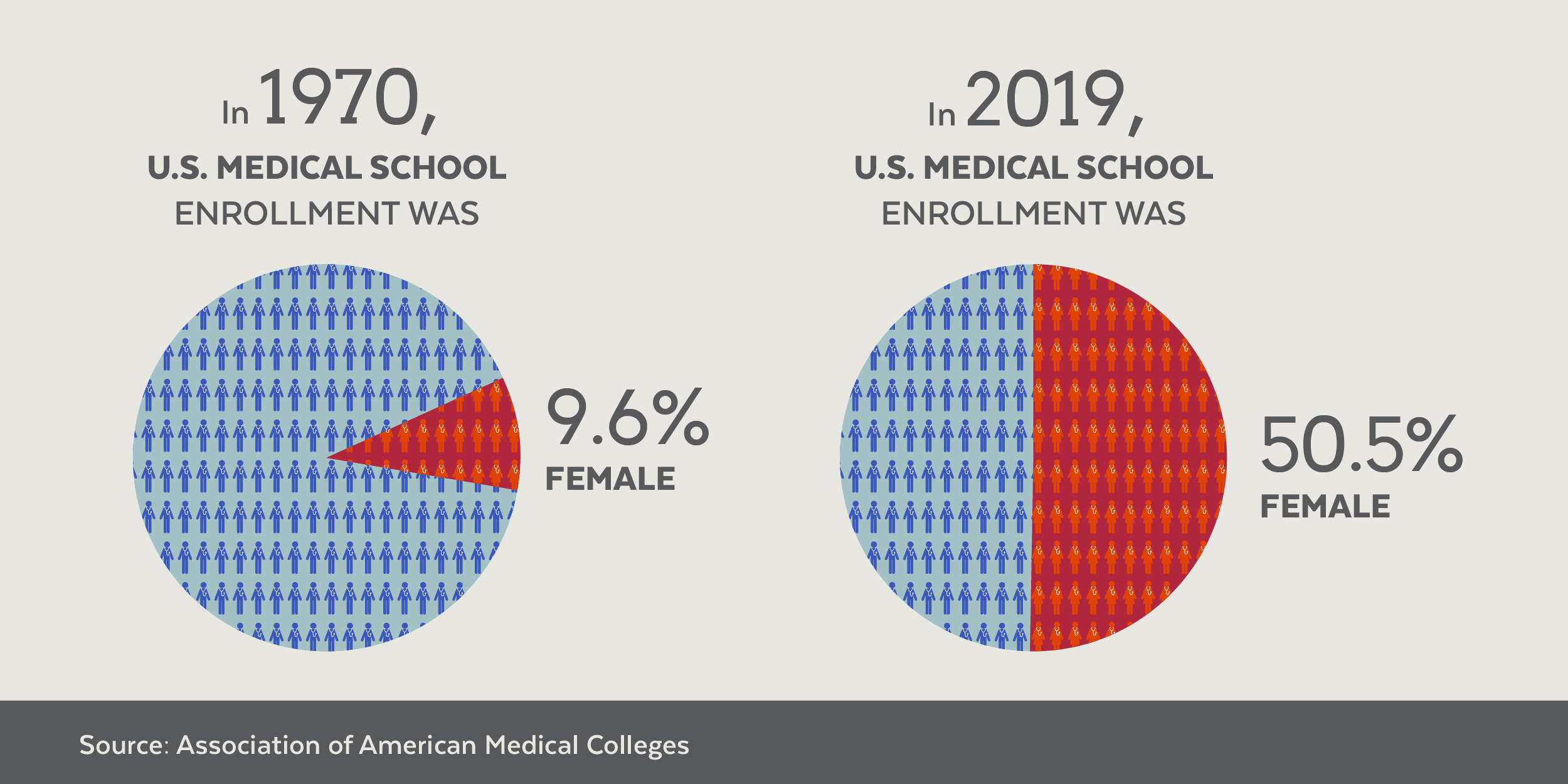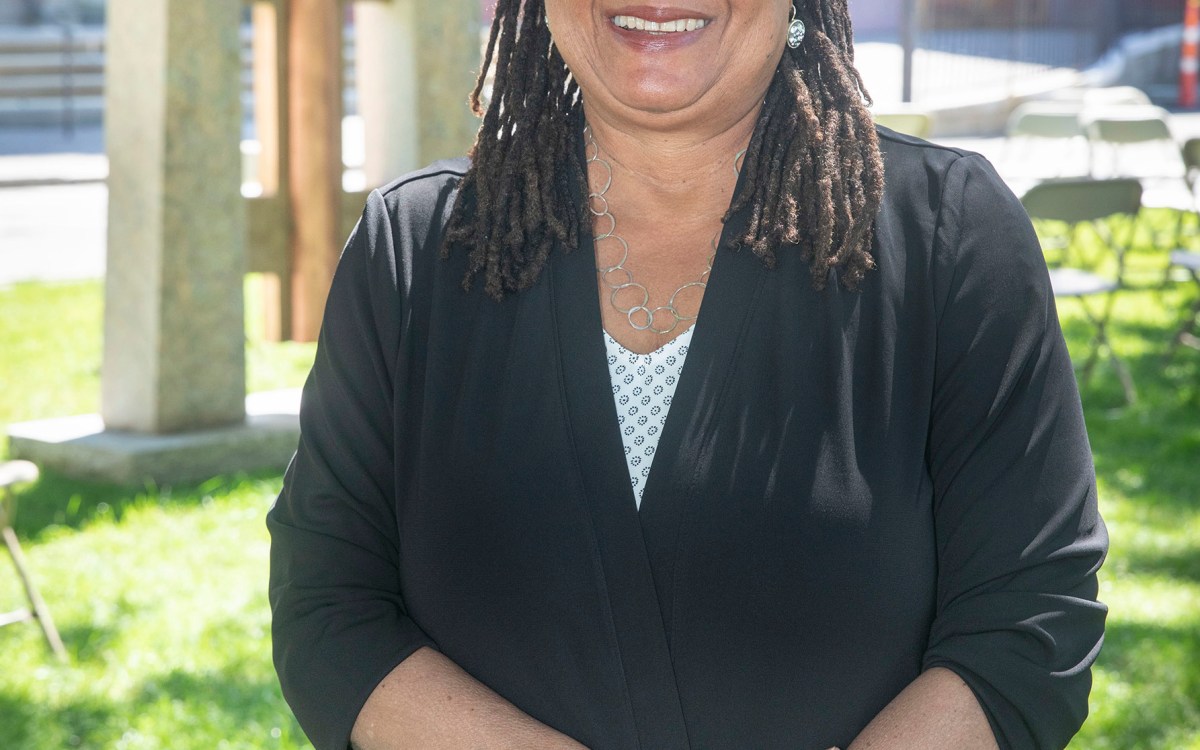
Rep. Patsy Mink (center), the first woman of color elected to the U.S. House, helped push Title IX through Congress. She’s joined at a 1979 press conference by Bella Abzug (left) and Gloria Steinem, other leading figures in the women’s rights movement.
AP File Photo/Harvey Georges
How Title IX transformed colleges, universities over past 50 years
Upended intercollegiate sports but also touched many corners of campus, forcing shifts in hiring, promotion, admissions, reckoning on sexual harassment, assault
A half century after its enactment, Title IX, the federal law that bars discrimination against women in education, has forced a leveling of the playing field on campus, though advocates say its work is still not done. In recent years, the law has forced a reckoning over sexual harassment and assault on campus, and its protections have been extended to cover bias on the basis of sexual orientation and gender identity. Those impacts follow on others, particularly in women’s sports, where the changes it forced have been described as “transformative.” The Gazette asked Jeannie Suk Gersen, the John H. Watson Jr. Professor of Law and an expert on gender and the law, and Susan Ware, A.M. ’73, Ph.D. ’78, historian and author of “Title IX: A Brief History With Documents” (2014) to discuss the legacy of the law. The two were interviewed separately for this piece, and both interviews were edited for clarity and length.
Q&A
Jeannie Suk Gersen and Susan Ware
Gazette: Why was Title IX needed when it passed in 1972? Didn’t the Civil Rights Act of 1964 ban discrimination in several areas based on sex?
Gersen: Women faced blatant educational inequality, such as exclusion from certain colleges and universities or from certain programs and spaces within those schools, higher admissions standards than men, more frequent tenure denials than men, and myriad other imposed disadvantages relative to men. Title VII of the Civil Rights Act had prohibited sex discrimination in employment but didn’t cover education, and Title IV had prohibited discrimination in federally funded entities but didn’t cover sex discrimination. So Title IX followed up in 1972 to fill the gap and directly address sex discrimination in education.
Gazette: Were there fierce partisan battles over the passage of Title IX?
Gersen: Title IX was passed with bipartisan support and was signed into law by President Richard Nixon. But it was wrapped in controversy as part of the wider controversial debate of the era about what equality would mean for women’s traditional roles in the home and in society, exemplified by the fight over the Equal Rights Amendment, which was ultimately not ratified and did not become a constitutional amendment.
Gazette: After 50 years, does it remain controversial?
Gersen: Title IX remains controversial because even as the ideal of equal opportunity and prohibiting sex discrimination are widely accepted as a general matter, what constitutes discrimination on the basis of sex has been fiercely debated. The meaning of “discrimination” and the meaning of “sex” have also become less settled over the decades, particularly as young people on campuses in each generation question what these concepts mean and breathe new and urgent meaning into the promise of Title IX. These debates keep the interpretations of Title IX controversial, even among people who have no trouble agreeing that sex discrimination in education is prohibited and unacceptable.
For decades, the general public associated Title IX with equal opportunity for female students in sports because athletic excellence had traditionally been associated with males, and girls’ and women’s sports were often neglected in terms of funding and support.
“The meaning of ‘discrimination’ and ‘sex’ have also become less settled over the decades, particularly as young people on campuses in each generation question what these concepts mean and breathe new and urgent meaning into the promise of Title IX.”
— Jeannie Suk Gersen, the John H. Watson Jr. Professor of Law

Photo courtesy of Harvard Law School
In the 1990s, the federal government made explicit that Title IX’s prohibition on sex discrimination covers sexual harassment, including sexual assault, because such misconduct impairs equal educational access. That tracked our evolving understanding of the various ways in which sex discrimination harms people, but it also set the stage for future controversy. In 2011, the Department of Education, along with the work of student activists, put a spotlight on sexual harassment and sexual assault, and colleges and universities were explicitly warned that if they did not investigate and adjudicate cases of sexual harassment or sexual assault appropriately, they may be violating Title IX, putting their federal funding at risk.
In the past decade there has been plenty of controversy over whether schools, including Harvard, are handling these issues appropriately. And what started as concern about whether victims were being fairly treated also became concern about whether accused individuals are being subject to fair procedures for investigating and adjudicating allegations against them because Title IX is supposed to protect both women and men, and both complainants and respondents, from sex discrimination. For some people, the idea that a law that protects women from discrimination also addresses discrimination against men, let alone people accused of sexual misconduct, is controversial.
Gazette: How would you characterize the impact on women’s sports?
Ware: Absolutely huge because women’s sports started with so little. This really gave them a chance to demand many more resources and participation opportunities. Once you point out that the men’s crew team has its own boathouse and the women have to change in their van and they don’t have showers, anybody can see that’s not fair, and it’s not equal. So just making a list of things that need to be addressed and having Title IX to back you up was a very effective way to get change. A lot happened really quickly because a lot of schools found that they could come up with more cash for the women’s programs, could get them uniforms and things like that. So you see an immediate jump forward. Once it inched up to women getting around 40 percent of the resources — they really should be getting at least 50, if not more — it’s been really hard to take that next step. It plateaued as early as the 1980s. There’s been a huge amount of change, but there is so much that needs to happen.
“Especially in terms of sports, Title IX is often presented as a zero sum game — if women gain, men lose.”
— Susan Ware, A.M. ’73, Ph.D. ’78

Photo by Tony Rinaldo
Gazette: Did the progress stall over concerns that more money for women’s programs could mean less for big money men’s sports like football and basketball?
Ware: That’s what it comes down to. One of my favorite quotes is, “There’s men, there’s women, and there’s football.” When it comes to intercollegiate sports, football is in a class by itself. From the very beginning, the NCAA was totally opposed to Title IX because it feared that it would upset their money-making arrangements. Especially in terms of sports, Title IX is often presented as a zero-sum game — if women gain, men lose. That is a very simplistic way of thinking about it because it is up to athletic departments to figure out what resources they have and how to distribute them. It doesn’t have to be simply, “We’re going to kill a men’s team because we have to add a women’s team.” There are ways to do this, yet very often Title IX gets blamed for cuts in men’s programs. The unfortunate thing is that collegiate sports have become basically semiprofessional in the big marquee sports — basketball and football — and they get a huge amount of resources. What are often referred to as men’s minor sports — things like tennis or wrestling or swimming — are competing along with all of the women’s teams for a tiny piece of the athletic pie.
Gazette: College campuses are clearly different places today compared to the 1960s. How much of that change is due to the impact of Title IX?
Gersen: Title IX had an enormous impact on educational access for women. Its meaning has also evolved over the decades in reflecting live debates about what constitutes sex discrimination and sex equality. So the influence of Title IX on campus and of campus debates on the meaning of Title IX has been a two-way street.

Graphic by Judy Blomquist/Harvard Staff
Gazette: Where do you think its greatest impact has been?
Gersen: Title IX’s most palpable impact has been the one that was most obviously envisioned by Congress: the prohibition of formal inequality in the treatment of males and females by schools that partake of federal funding. It’s important not to take that impact for granted. But in our era, the deepest impact of Title IX has been on schools’ bureaucratic and administrative structures and practices in order to implement the federal government’s expectations, based on its interpretations of Title IX, for dealing with campus allegations of sex discrimination, sexual harassment, and sexual assault.
Ware: It is clear that Title IX has had a transformative impact on many aspects of women’s experience in higher education, starting with sports but then later engaging with issues of sexual harassment and sexual violence on campus. It really has made a very large difference. It’s also proven handy having a law on the books that you can point to when something is wrong at your university. You can say, “This violates Title IX,” or “I’m going to file a Title IX complaint.” If you compare now and 1972 and look at the state of women’s sports, which were nonexistent, basically, and at the number of women faculty at Harvard or any other institution, the number of women in professional schools — just a whole range of things — it really has been a huge change.
I think there should have been more change. With sports it went from zero to 40 percent, but I’d like it to keep going, and I’d love it if half the faculty at Harvard or any other place were women. But it’s much better than when I was there in graduate school, when just the thought of having a woman faculty member in the History Department seemed like shooting for the moon. I think one of the best characterizations I’ve heard about Title IX is that it’s sort of like the guillotine out in the courtyard: It has an impact just because of its existence that is different from having complaints filed against the school and threatening to withdraw funds. It says, “Sex discrimination is illegal in higher education.” I think a lot of the change has come from that.

Graphic by Judy Blomquist/Harvard Staff
Gazette: How about the rights of transgender students?
Gersen: One of the signature Title IX debates of our decade is how the law’s prohibition on sex discrimination in education applies to transgender students. Last year, the Supreme Court interpreted Title VII’s prohibition on sex discrimination in employment to apply to discrimination against transgender individuals because it reasoned that treating a person differently because they are transgender is a form of discrimination on the basis of sex. It is unclear exactly what this means for the currently controversial issue of transgender female athletes competing in girls’ and women’s sports. On this issue, we have a lot of debate ahead on what it means to discriminate on the basis of sex, and what it means to provide the sexes equal educational opportunity.
Gazette: Do you think it has impacted you and your academic career?
Gersen: Of course Title IX has impacted the opportunities afforded me as a student and a professor, and the fact that Title IX was sponsored by Patsy Mink, the first Asian American congresswoman, has been meaningful to me as well. I think the simplicity of the promise of equal opportunity in Title IX combined with the complexity of its meaning, evolution, and implementation — and the work that is needed to explicate and apply it in a changing society — have deeply impacted my academic career.
Ware: I graduated from college in 1972, and I’m a good athlete. I run. I play tennis. I would have loved to play on a team, but I never got a chance to. In terms of my own professional advancement as a scholar, I have been in academia for my whole career, and I have seen the changes in the acceptance of women faculty, their numbers and pay equity and things like that. But I’m also well aware that you have to pay attention because if you start comparing salaries in a history department, you realize that the men are still getting paid more than the women, sometimes with rather large discrepancies. You just have to keep at it. Maybe some time we won’t still need to, but it doesn’t seem like it’s going to happen in my lifetime. Change happens slowly.
Gazette: What do you see ahead for the law’s continuing implementation?
Gersen: It is difficult for me to imagine a time when the meaning of Title IX will be completely settled.







